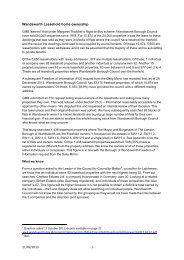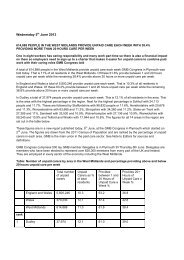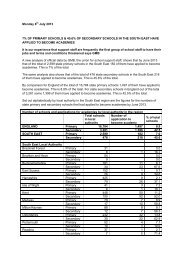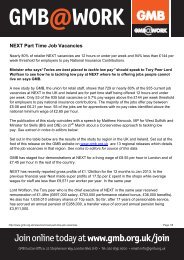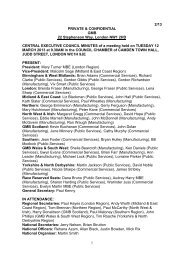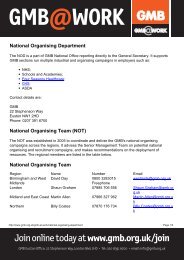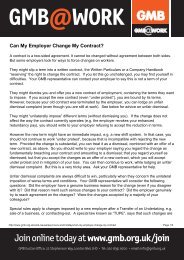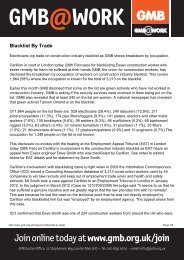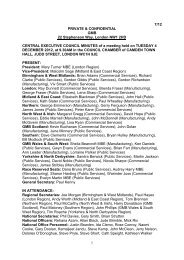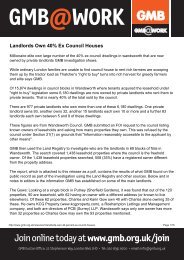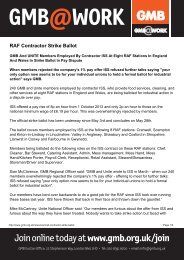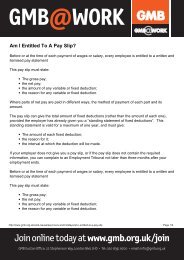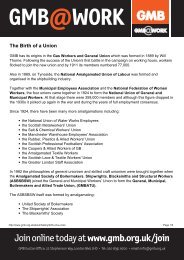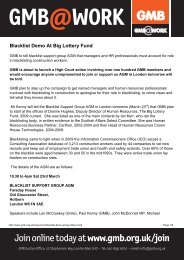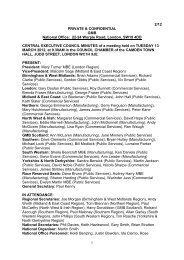WO toolkit 2012 complete.pdf - GMB
WO toolkit 2012 complete.pdf - GMB
WO toolkit 2012 complete.pdf - GMB
You also want an ePaper? Increase the reach of your titles
YUMPU automatically turns print PDFs into web optimized ePapers that Google loves.
SECTION 2.8<br />
HANDLING OBJECTIONS<br />
One of the reasons recruitment can be difficult nowadays is because in many modern workplaces<br />
people have little or no knowledge or experience of trade unions.What people see on TV and read in the<br />
papers often forms their views.Since unions tend to make the news only when there is a dispute,many<br />
people believe that this is what they are all about.<br />
Some of them may have prejudices or preconceptions about trade unions,it is best to be prepared to<br />
handle these objections before they arise.Here are some of the questions you might be asked and<br />
some ideas on how to answer them:<br />
Why should I join <strong>GMB</strong>?<br />
Most people join <strong>GMB</strong> in case a problem arises at work.At some point in their working life most workers<br />
will have a problem at work they can’t sort out on their own.Being in <strong>GMB</strong> means making sure you get<br />
help from people working around you when you need it,plus expert legal backing if necessary.<br />
You should also mention the work <strong>GMB</strong> is currently doing where you work on the problems people face<br />
with the employer: health and safety,pay,bullying and other issues.<br />
What has <strong>GMB</strong> ever done for us?<br />
Be prepared for this question and mention successes in your workplace.Health and Safety,support for<br />
people in grievances or disciplinary meetings(remember to keep personal details confidential)legal<br />
action,improvements in pay,holidays etc.<br />
It is also important to spell out what <strong>GMB</strong> stands for and is campaigning for now and to invite them to<br />
join on the basis of supporting that campaign.<br />
Why should I join if I’ll get the same pay anyway?<br />
It is important to stress that,although they might get the same pay and conditions that <strong>GMB</strong><br />
negotiate it is a matter for the employer and can’t be guaranteed by <strong>GMB</strong>.However non-members will<br />
miss out on being able to have a say in how <strong>GMB</strong> negotiate for them.They won’t get a chance to speak<br />
out or vote on any deals being negotiated.If they have any problems at work they are on their own.They<br />
can’t call on the <strong>GMB</strong> Workplace Organiser or <strong>GMB</strong> officer to advise and support them.<br />
Non-members also miss out on legal benefits and services,like help from union solicitors.<br />
Every non-member in a workplace dilutes the strength of <strong>GMB</strong>’s voice when negotiating with<br />
management.<br />
If I join will I have to go on strike?<br />
Not unless you and your colleagues vote for it,reassure new recruits that strikes are very rare.A good<br />
tactic sometimes is to ask them to tell you the last time they remember a strike taking place where<br />
they work.<strong>GMB</strong> Workplace Organisers and <strong>GMB</strong> Officers work to settle disputes and prevent the<br />
situation developing into one where people feel they have to vote for strike action.In <strong>GMB</strong> we normally<br />
only have strikes when a two-thirds majority has voted for them in a secret postal ballot.<br />
<strong>GMB</strong> sees strike action as a last resort and it is only very rarely that our members take this step.<br />
However,in negotiation with employers you sometimes need to have an ultimate bargaining tool to get<br />
them to listen.<br />
The key point is to tell the worker that it is the members who tell <strong>GMB</strong> to go on strike and not the other<br />
way around.



